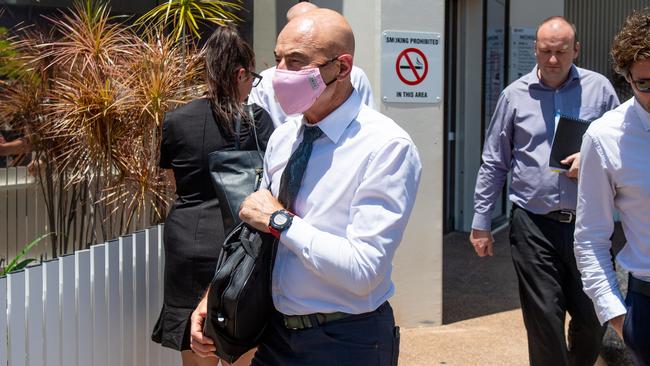Heggie takes ‘personal responsibility’ for deaths of three kids, inquest hears
NT Chief Health Officer Hugh Heggie takes personal responsibility for the deaths of three Aboriginal children who died after a long history of petrol sniffing, a court has heard

Police & Courts
Don't miss out on the headlines from Police & Courts. Followed categories will be added to My News.
- Mental health boss didn’t understand legislation relating to managing petrol sniffing cases, inquest hears
- Inquest lays bare tragic petrol sniffing deaths of three children in remote NT communities
NT Chief Health Officer Hugh Heggie takes personal responsibility for the deaths of three Aboriginal children who died after a long history of petrol sniffing despite having contact with the health department, a coronial inquest has heard.
Dr Heggie gave evidence at a coronial inquest into the deaths of – Ms B, 17, Master W, 12, and Master JK, 13 – in the Darwin Local Court today.
MORE CRIME AND COURT NEWS
Alleged Hells Angels associates arrested after police raid: Multiple charges laid
Woman arrested for allegedly spitting at ambulance worker outside RDH
Cops refer licenced venue for flouting booze restrictions
The families of the children asked that their full names not be used.
Mark Thomas, the barrister for the family of Ms B, asked Dr Heggie why Ms B’s case was not elevated to him within two weeks – as the relevant legislation stipulates because Ms B was considered to be at “high-risk” of serious harm.
Dr Heggie admitted a mistake had been made by department staffers in not alerting him to Ms B’s situation “in a consolidated way”.
“I’m sad I really feel for the family because they were reaching out, as Ms B was, for someone to keep her safe,” Dr Heggie said.
“I can only say to the family I wish I’d been aware of all this together.
“For me personally, I take responsibility that this young person lost her life.”
Dr Heggie said a lot of the problems arose because incidents involving the children were sometimes treated in isolation instead of altogether, and because case workers for the Health Department had such a heavy workload.
“I can see (on Ms B’s file) that the information was not either validated or corroborated,” Dr Heggie said.
“They were busy, under the legislation looking at the low-risk cases.”
The inquest also heard evidence from Territory Families Northern Region executive director Karen Broadfoot, who said several incidents involving Ms B reported to the department were “screened out” when they should have been investigated further.
LIMITED TIME: New NT News subscription offer: $1 a week for the first 12 weeks
This includes when Ms B reported being raped by a family member who was living in her house, and she was not removed by the department.
“I consider this to be a significant failure on behalf of (the department),” Ms Broadfoot said.
The inquest continues.


